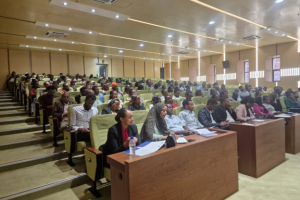
It is agreed that education plays a key role in the socio-economic and political well-being of a given society and in ensuring the nation’s prosperity. That is why the government and other stakeholders are aggressively working in the sector to bring about a radical shift in the sector. This includes the active involvement of all educational agents including the efforts of state education bureaus.
The commitment to improving educational standards at the regional level plays a pivotal role in shaping the future of the nation. As it is repeatedly indicated by the government in the quest for national development, quality education stands at the front as a fundamental pillar for progress. Addressing the challenges the sector faces is not merely a matter of improving educational outcomes; it is also essential for the overall development and prosperity of the country.
As indicated by South Ethiopia Chief Administrator Tilahun Kebede in his remark at the 2nd Education Conference held in Wolaita Sodo Town under the theme “Exceeding dedication to quality education and the prosperity of the country,” education plays a key role in enhancing the social and economic benefits of the society and ensuring the country’s prosperity.
Seeing the multi-dimensional roles of education, the government is aggressively working to ensure quality education and enhance accessibility to all.
Tilahun said that the government is decisively working to nurture students whose academic excellence is refined by quality education. In this regard, it is undertaking various activities with the main objective of producing efficient students who are capable enough to address the multifaceted challenges of society by equipping them with the needed knowledge and skills and building their problem-solving capability.
According to him, considering the challenges that may happen during the transformation periods, the South Ethiopia State is working in coalition with all concerned bodies to bring about quality education.
He also said that effective leadership in the educational sector has a key role in addressing quality-related challenges in the sector and producing students who are capable of addressing the social and economic challenges of society.
Regarding reducing the rate of student dropout in the State, Tilahun said that strengthening the school feeding program is one solution to address the problem. Improving quality education should not be left only to certain government authorities. It needs the active participation of the entire society. Providing necessary educational inputs, engaging in school renovation activities, and creating a conducive learning and teaching environment, are some ways that the society can involve and discharge societal responsibilities to address some of the challenges of schools in the State. What is more, building the capacity of teachers is important to ensure quality education.
Speaking on his part, the State`s Education Bureau Head, Abebayehu Tadesse (PhD) said that the government has set a goal to ensure quality education as a standard to guarantee Ethiopia`s prosperity.
According to him, taking educational quality seriously and applying the “One Book for One Student” initiative are among the measures the State has taken to realize quality education.
He pointed out that more than 213 million Birr has been collected through the “One Book for One Student” initiative which was initiated by the Chief Administrator of the State and activities to publish books from pre-school to third grade have already started.
According to the information obtained from the State’s Communication Bureau, the efficiency of the 8th-grade students, which was 14 percent in the previous Ethiopian budget year, has increased to 42.57 percent in this budget year. The report indicated that at this year’s Ethiopian academic year, 15 percent of the total students who attended their studies in the State scored less than 50 percent.
Sources indicated that one of the most pressing challenges faced by schools in South Ethiopia State is the lack of adequate educational materials. Textbooks, learning resources, and technological tools are essential for effective teaching and learning. When students lack access to these materials, their educational experience is compromised, leading to poor academic performance and decreased motivation.
To combat this issue, authorities in the State must prioritize the procurement and distribution of essential educational materials. Partnerships with non-governmental organizations and private sectors can also be vital to enhance resource availability. By ensuring that every school is adequately equipped, we can create an environment conducive to the learning and teaching process and academic success.
What is more, effective leadership is fundamental to the success of any educational initiative. The South Ethiopia State Education Bureau has identified gaps in leadership at various levels, which impede the implementation of educational policies and programs. Strong leadership is needed to inspire educators, mobilize resources, and foster a culture of accountability. To address this challenge, targeted leadership training programs should be established to enhance the capacity of school administrators and education officials.
Another factor that contributes to increased dropout rates of students is the lack of nutrition. School feeding initiatives not only provide essential nutrition but also create an incentive for families to send their children to school. When students receive meals at school, their overall well-being improves, leading to better academic performance and reduced dropout rates. Thus, it is imperative for the regional government to work in collaboration with local and international partners to establish sustainable school feeding programs.
The challenges facing the education sector in South Ethiopia are significant but not insurmountable. The state’s leadership acknowledged the bottlenecks like the scarcity of educational materials, leadership deficiencies, and the need for school feeding programs are at the first step. In this regard, investing in quality education in states is investing in the overall economic and social affairs of the nation.
Here, it must be noted that quality education is not merely about the transmission of knowledge; it is about empowering individuals and communities. It equips learners with essential skills, fosters critical thinking, and prepares them to meet the challenges of a rapidly changing world. The commitment to enhancing quality education will ultimately contribute to the overall development of the nation, paving the way for a more prosperous, equitable, and stable society.
In this regard, all the bottlenecks that are mentioned by the State`s and Bureau`s Head need to be addressed. Several critical bottlenecks that hinder the provision of quality education in the State need the active involvement of all – the school community, parents, the State, the community at large, and stakeholders at all levels. These challenges, including the scarcity of educational inputs, leadership, and the need for redoubling school feeding programs to prevent dropouts and other challenges require urgent attention.
BY LEULSEGED WORKU
THE ETHIOPIAN HERALD SATURDAY 31 AUGUST 2024




